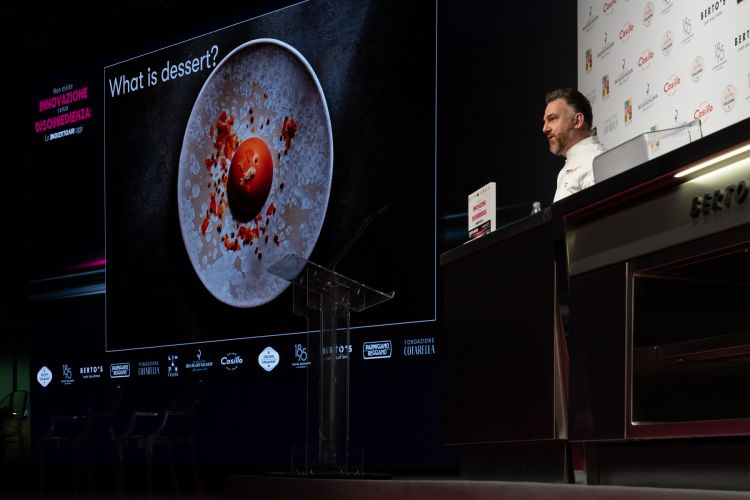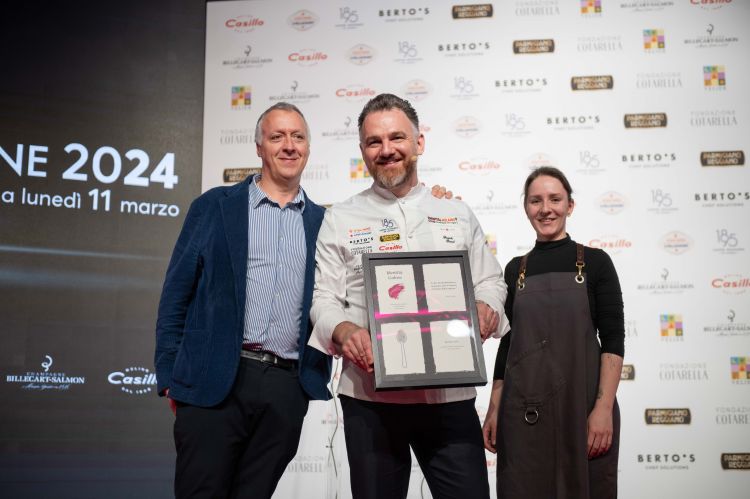Before pastry chef René Frank took the stage at Identità Milano, an audience of onlookers quickly filled the auditorium. Whether they were lovers of sweet flavours matters little, because at Coda, the Berlin dessert restaurant with two Michelin stars, dishes usually relegated to the conclusion of a tasting menu become the protagonists of a multi-course itinerary, where umami plays a crucial role.
‘My restaurant is inspired by desserts and is the result of eight years of work, development and change,’ Frank confirms. The winner of the Best Pastry Chef Award from The World's 50 Best Restaurants in 2022, the South German-born pastry chef was charmed by Berlin's magnetic appeal, and picking it as the home for his Coda in 2016. ‘This city is the epitome of freedom and disobedience. Anyone here can be what they want, explore themselves and create their own world.’
Thanks to this climate of openness, René Frank is enjoying the success of a format created ‘to do justice to the very last course’, turning the spotlight on the world of dessert (and beyond), thanks to a menu entirely designed to enhance the root of each ingredient. This approach has been present since the first service eight years ago, but has evolved in taste: 'after a running-in period, we launched a six-course tasting menu. The first star came in 2019, the second in 2020. From that moment on, we realised we had taken an extra step and had become to all intents and purposes a dessert restaurant, capable of enhancing all the senses, such as umami, which we obtain with shiitake mushrooms, seaweed, cheese and fermented proteins.’ At Coda, therefore, ‘the most fun thing is having a pastry chef who can create an entire menu, from start to finish, incorporating any ingredient you want. For example, we treat aubergines, yellow tomatoes and many vegetables as if they were fruits, while the cocktail pairing, which becomes part of the recipe, completes the experience,' Frank declares assertively on stage.

At Identità Milano 2024, the chef explained to the audience how a dessert is created, quoting how the first step is understanding its serving context. ‘In Anglo-Saxon countries practically any sweet recipe is called a dessert, but there is a big difference between those sold in a bakery (which are consumed even one or two days later) and the fresh ones served in a restaurant. In the restaurant you have 100 per cent control over what you’re doing and you don't need a long shelf life.’

Caviar popsicle replaces the chicken eggs used in pastry making with fish roe with their umami flavour; this is an artichoke and vanilla ice cream with a heart of dates, covered with caviar tempered with chocolate
One of the two dishes that Frank made live is emblematic of this approach. It is a Caviar Popsicle created to provoke the pastry world, which is accustomed to using large quantities of chicken eggs.
‘So why not use fish roe, with their umami taste and salinity? - wondered the chef. The result is an artichoke and vanilla ice cream with a heart of dates, covered with caviar tempered with chocolate, so that it remains frozen on the inside, but soft on the outside. ‘The inspiration came from an ice cream I used to eat as a child that I can no longer find today.’

Gabriele Zanatta, who moderated the lecture, René Frank and one of his collaborators on stage at Identità Milano
All these pairings of flavours would not be possible today without a bit of disobedience and Frank's refusal to follow a traditional path. ‘For me, disobedience means abandoning traditional labels and feeling free to do what I want. I call my dishes non-binary because they do not conform to classical criteria nor to the canonical rules of pastry making.
There is no category to identify them,' the chef concludes and adds a provocation: 'Why does food always have to be judged or pigeonholed? The real disobedience in fine dining in Berlin is to reject labels in favour of taste.
Translated into English by Slawka G. Scarso